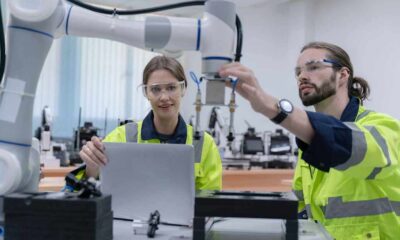News
The Impact Of Technology On Society

Technology has become an integral part of our society, revolutionizing the way we live, work, and interact with one another.
From smartphones and social media to artificial intelligence and virtual reality, the advancements in technology have had a profound impact on various aspects of our lives.
In this post, we will explore the positive and negative effects of technology on society.
Enhancing Communication and Connectivity
One of the most significant ways technology has transformed society is through its impact on communication. In the past, people relied on traditional methods such as letters and landline phones to connect with one another. However, with the advent of smartphones and the internet, communication has become faster, easier, and more convenient.
Read also: “My Head, My Head”, They Cried, Fell & Died over N280m Winners’ Property
Nowadays, we can instantly connect with friends and family through social media platforms, video calls, and messaging apps. This has not only bridged the gap between long-distance relationships but also facilitated global connections and collaborations. Technology has made the world a smaller place, allowing us to communicate and share ideas with individuals from different cultures and backgrounds.
Advancing Education and Learning
Technology has also revolutionized the field of education, transforming the way students learn and teachers teach. With the rise of e-learning platforms, students can access educational resources and courses from anywhere in the world. This has made education more accessible and affordable, breaking down barriers and providing opportunities for individuals who may not have had access to traditional educational institutions.
Furthermore, technology has enhanced the learning experience through interactive and immersive tools. Virtual reality and augmented reality have allowed students to explore and engage with subjects in a more hands-on and visual manner. This has not only increased student engagement but also improved retention and understanding of complex concepts.
Improving Efficiency and Productivity
Technology has significantly improved efficiency and productivity in various industries. Automation and artificial intelligence have streamlined processes and eliminated repetitive tasks, allowing employees to focus on more complex and creative work. This has not only increased productivity but also reduced the risk of human error.
Moreover, technology has provided businesses with valuable data and analytics, enabling them to make informed decisions and optimize their operations. With the use of big data and machine learning algorithms, companies can analyze consumer behaviour, market trends, and performance metrics to gain a competitive edge in the market.
Challenges and Concerns
While technology has undoubtedly brought numerous benefits to society, it also presents certain challenges and concerns. One of the primary concerns is the impact of technology on jobs and employment. As automation and artificial intelligence continue to advance, there is a growing fear that many jobs will become obsolete, leading to unemployment and income inequality.
Another concern is the impact of technology on mental health and social interactions. With the rise of social media and digital communication, individuals are becoming more isolated and experiencing higher levels of anxiety and depression. The constant exposure to curated online personas and the pressure to portray a perfect life can have detrimental effects on one’s mental well-being.
Conclusion
Technology has undoubtedly transformed society in numerous ways, enhancing communication, advancing education, and improving efficiency. However, it is essential to recognize and address the challenges and concerns that arise alongside these advancements. By understanding the impact of technology on society, we can harness its benefits while mitigating its negative consequences. Ultimately, technology should be a tool that serves humanity and enhances our lives, rather than a force that controls or isolates us.























